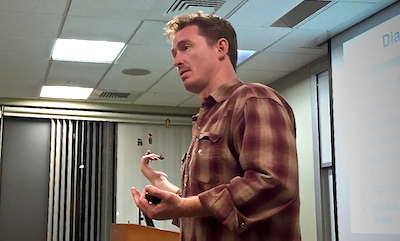In the Classroom: To Teach Trauma, Alumnus Tells His Story.
 When Joseph King (MPH’10, MS’12) was a student at SPH, certain subject matter had an effect on him that he only made sense of later.
When Joseph King (MPH’10, MS’12) was a student at SPH, certain subject matter had an effect on him that he only made sense of later.
“I realized in retrospect that I was being triggered by some of this material,” King said, back in the classroom on a recent evening to discuss trauma and post-traumatic stress disorder (PTSD) in GH720: Social and Behavioral Sciences in Global Health, taught by Assistant Professor of Global Health Jennifer Beard.
King is the founder of Other Lives, a peer-led trauma survivors’ network and advocacy organization.
As an MPH student focusing on global health, King had experienced what he would later realize were flashbacks. He completed his MPH, then an MS in environmental health. He went to work at an environmental consulting firm. At the same time, his symptoms were getting worse, and in early 2014 he voluntarily admitted himself to inpatient psychiatric care. It was then that King finally learned he had what is called complex post-traumatic stress disorder (C-PTSD).
A diagnosis helped King address and work with trauma from his own childhood—but, he told GH720, he also had two public health degrees and wanted to use them. “This became an area of expertise for me because I’m a nerd,” he said. “I actively engaged in my own recovery, and I wanted to know everything about it.”
King learned the neurological basis of trauma. He studied the history, from classical Greek tragedies to the Vietnam War, second- and third-wave feminism, and the recent research on the effects of emotional abuse on children. He studied the ever-developing definitions of PTSD and C-PTSD in the Diagnostic and Statistical Manual of Mental Disorders (DSM).
He also studied resilience, and the intersecting helpful and harmful factors—privilege and oppression—that affect someone’s chances of developing and successfully coping with a trauma disorder.
In GH720, King shared that knowledge, but he also spoke as someone who knows trauma from both a public health perspective and a personal one.
King said he saw how stigma creates huge barriers to treatment, and ultimately to regaining control of one’s life. He said he realized telling his own story could help combat that stigma—so he did. King’s essay “I Have Complex PTSD. It Works Like This.” describes his own experience of trauma from an abusive father and its aftereffects. The essay has been read 7,800 times since it went up in April 2016.
He would go on to write more about his experience with C-PTSD and childhood trauma. After Donald Trump suggested veterans who experience trauma disorders are just not “strong enough” at a campaign event in early October, King wrote a response about his father, a marine who King said clearly suffered from undiagnosed PTSD.
“We have a cultural problem,” King said. He explained trauma is relational, created not only by the perpetrator of the traumatic event but the bystanders who do not intervene, “sending the message that this is normal.” Likewise, recovery is relational, something done with wider support and acceptance—or hindered by stigma, bias, and dismissal.
King told several stories during the class, including the only time King knew of that his father sought treatment.
“It was right after a bender,” King said, that his father went to a hospital and tried to check himself in. “He reeked of alcohol—but he was sober,” King says. The person at the front desk told him he couldn’t check in drunk. When he insisted he was sober, she had him take a Breathalyzer test. “Zero point zero,” King said. “She said, ‘It must be broken,’ and she went and got another test. He blew 0.0 again.
“And she said, ‘This one must be broken, too.’”
King’s father left, and never sought treatment again. “As public health workers we have to be thinking about this,” King said. “We have to be thinking about where someone is coming from. Don’t be the one who says, ‘This one must be broken.’”
After the class, Beard said personal, first-person stories like these are vital to public health. “Because we talk about populations,” she said, “we very rarely—especially when we’re talking about mental health—actually hear from the people themselves.
“Knowing what Joe went through when he was here, I wanted to have a conversation with students about what it means to be trauma-informed when you’re working with highly vulnerable populations, and what it means to be trauma-informed when you’re talking to your classmate.”
“The most valuable thing you can do,” King said, “is recognize and validate that everyone has a different story.”
Comments & Discussion
Boston University moderates comments to facilitate an informed, substantive, civil conversation. Abusive, profane, self-promotional, misleading, incoherent or off-topic comments will be rejected. Moderators are staffed during regular business hours (EST) and can only accept comments written in English. Statistics or facts must include a citation or a link to the citation.